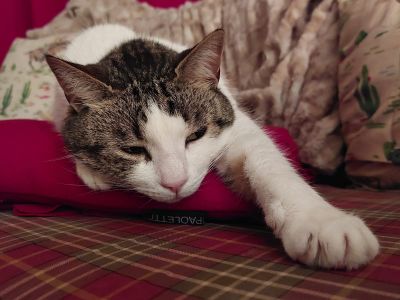
Posted By:
Over the past 30 years the wealth of information within the veterinary profession and the available treatments have increased exponentially. New treatments are being looked for all the time for previously fatal conditions, and this could not be epitomized more than in the case of Albie.
Albie, a 7-year-old male neutered cat, initially presented to us back in September ’23 due to a reduction in appetite and weight loss over the previous month. We found he had lost almost a quarter of his bodyweight from when we had last weighed him. When examined, the main examination finding with Albie was an irregular mass within his abdomen which at the time could have reflected an irregular organ, tumor, or inflammatory mass. Other cats in the area were known to be positive for a virus called FeLV (feline leukemia virus) – this virus can cause cancers and weakened immune systems in some cats and is therefore something we vaccinate against. Given the FeLV risk we opted to test for this first but thankfully he was found to be negative.
The next stage in investigating this irregular abdominal structure was imaging, namely an ultrasound scan. Ultrasound allows you to identify most abdominal organs and assess any irregular structures to work out where they are arising from. On Albie’s scan his liver, spleen, kidneys, bladder, and intestines were all found to be normal. The irregular structure/mass was separate to all other organs and a needle sample was taken to work out what it was. Unfortunately, as can sometimes happen with such small samples, the results were inconclusive. On a positive note, lymphoma (a cancer of the immune system and lymph nodes), which was a very possible cancerous cause of the mass at this stage, is normally readily identified on needle samples and so this made this less likely. Other types of cancers remained possible as did infectious conditions that can cause non-cancerous masses to develop, particularly tuberculosis and a condition known as feline infectious peritonitis (FIP). In fact, some of the cells on the earlier needle sample suggested one of the latter 2 differentials.
To obtain a definitive diagnosis a second sample was taken; a ‘core biopsy’ (like coring an apple) performed with a specific type of coring instrument. This larger sample allowed the tissue to be looked at in more detail and gave us an answer – Albie had a condition known as feline infectious peritonitis (FIP).
FIP has been known about for decades, has been untreatable and has always been fatal… until 2021. It emerged in the late 1950’s and was first described as ‘an important disorder in cats’ in 1963 (Holzworth). It was not until 1978 (Pedersen et al.) that the cause of FIP was found – it is caused by a coronavirus (known as feline coronavirus). This is not the same coronavirus that causes COVID-19 but has similarities. Whilst many cats can carry this virus and be fine, in others the virus mutates and causes the disease FIP. FIP comes in different forms where it can form inflammatory masses (such as in Albie) or causes fluid build. It can also affect different areas, but the outcome was always the same – euthanasia or death – until now.
Due to the human coronavirus COVID-19 pandemic coronavirus is have become extensively studied. This has finally led to a treatment for a condition which over the previous 60 years had inevitably been terminal and which some vets thought might never have a cure. Regardless of the type of FIP or area affected the treatment is the same – Remdesivir and the very catchy tablet GS-441524! These are effectively the same drug, with the former being the IV form and the latter being the oral tablet form. Albie was given the IV remdesivir initially and was then transitioned onto the oral GS-441524 given at home by the owners. The inflammatory mass present in his abdomen had gone after 2 weeks but Albie’s weight had dropped further. Despite this and following discussion the owners opted to continue before finally improvements were seen. From this point on Albie’s weight began to increase and he is now back at his earlier levels. The owners report that he is brighter and more active than ever and will shortly be finishing his treatment course. FIP treatment lasts for 84 days and at present is expensive, but it finally gives us cause to be optimistic regarding the treatment of this once lethal disease.
- Vet Josh
At Shepton and Wells Vets, your pet's health means more; it's our heartfelt commitment. As we share in the joy of recoveries and stand by you during challenging moments, thank you for entrusting us with their care. Your pets are not just patients.
Whilst on my visits I have been having several discussions...
As our feline friends get older there are a few conditions...
Another winter discussion group season is now behind...
©2024 Shepton Veterinary Group Ltd., All rights reserved.
Privacy Policy • Terms & Conditions • Cookie Policy